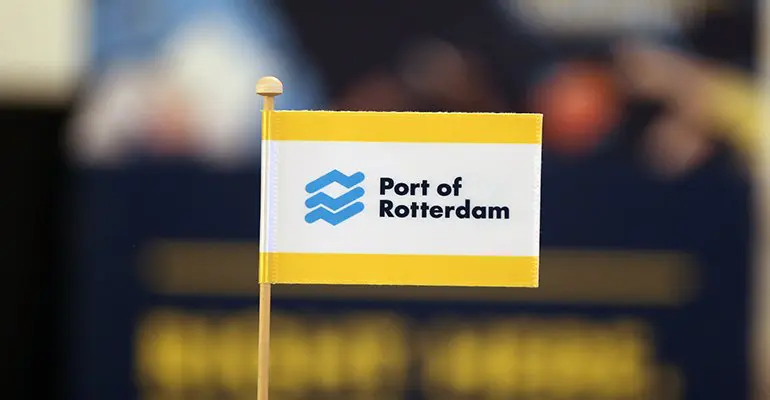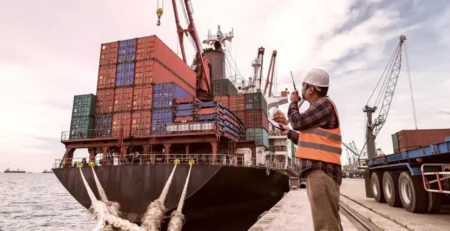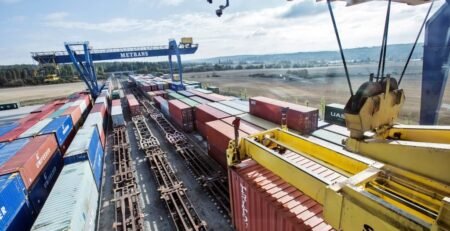EXCLUSIVE: Rotterdam & Antwerp-Bruges Lead Europe’s Green Maritime Transition

By Eva Richardson
March 3, 2025 – The ports of Rotterdam and Antwerp-Bruges are spearheading Europe’s push for a sustainable maritime industry, calling for the urgent implementation of the Clean Industrial Deal to drive decarbonization and improve operational efficiency. As two of Europe’s largest and most influential shipping hubs, their leadership in green energy solutions is expected to set a benchmark for the global maritime sector.
Decarbonization at the Forefront
With maritime shipping accounting for nearly 3% of global CO2 emissions, the push for carbon neutrality by 2050 has intensified. Rotterdam and Antwerp-Bruges, handling over 500 million tonnes of cargo annually, are now actively accelerating the adoption of:
- Green hydrogen infrastructure to power vessels and port operations.
- Shore power capabilities, reducing emissions from docked ships.
- Carbon capture and storage (CCS) projects to mitigate industrial pollution.
“The Clean Industrial Deal is not just a proposal—it is a necessity,” said Marc Adrians, CEO of Antwerp-Bruges Port Authority, in an exclusive statement to The Logistic News. “We cannot afford delays in transitioning toward cleaner energy solutions.”
Implications for Global Maritime Logistics
The shift towards greener port operations is expected to:
- Increase compliance costs for shipping lines, requiring investment in low-emission technologies.
- Revolutionize fuel supply chains, creating new opportunities in green hydrogen and alternative fuels.
- Encourage regulatory alignment, pressuring other global ports to adopt similar sustainability measures.
Industry Experts Weigh In
According to Glyn Hughes, Director General of The International Air Cargo Association (TIACA), these initiatives represent a turning point for global maritime trade.
“The ports of Rotterdam and Antwerp-Bruges are demonstrating leadership that others must follow. This green transition will redefine competitiveness in the logistics sector,” Hughes stated.
Challenges and Next Steps
Despite these ambitious plans, financing and regulatory bottlenecks remain key hurdles. Industry stakeholders stress the need for EU-wide policy alignment and public-private partnerships to ensure the success of large-scale sustainability projects.
The European Commission is expected to finalize its Clean Industrial Deal roadmap by mid-2025, with Rotterdam and Antwerp-Bruges serving as pilot models for future green port initiatives worldwide.
The Future of Sustainable Ports
With global climate targets tightening, the race toward sustainable port operations is accelerating. The next five years will be crucial in determining whether major maritime hubs can transition efficiently without disrupting global supply chains.
For more insights on sustainability trends in maritime logistics, stay tuned to The Logistic News.
The post EXCLUSIVE: Rotterdam & Antwerp-Bruges Lead Europe’s Green Maritime Transition appeared first on The Logistic News.
Share this post
Related
Posts
Argentina, Brazil, and Mexico Fast-Track Regional Freight Agreements
BUENOS AIRES — July 4, 2025Faced with weeks of delayed cargo and unstable ocean routes, Latin America’s biggest economies are...
European Rail Freight Gathers Pace as Transit Times Improve in Poland
WARSAW — July 4, 2025Freight rail in Poland is accelerating, signaling a welcome turnaround for European inland transport. New data from PKP...
Freight Delays Mount at Toronto Pearson After Two Days of Storm Disruptions
TORONTO — July 4, 2025Cargo operations at Toronto Pearson International Airport are struggling to recover after two consecutive days of...
HIVED Secures $42M to Bring Greener Deliveries to More UK Cities
LONDON — July 4, 2025HIVED has raised $42 million to expand its all-electric parcel delivery service. The London-based startup says...





